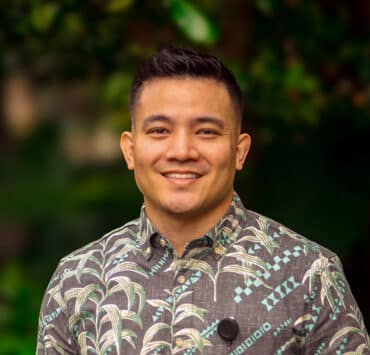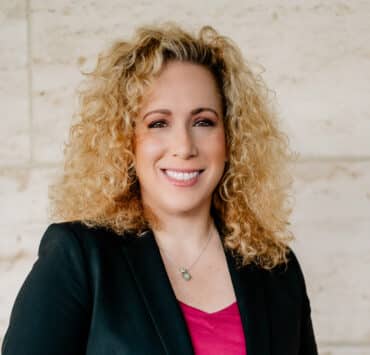As a Pakistani American Muslim who grew up in the Philadelphia suburbs and served as an advocate for close family members navigating the healthcare system, Amtul Sufi knows what it is like when people make snap judgements about you and how that can impact your daily life and health outcomes. These intersecting experiences served as a driver for her to pursue two of her greatest passions, diversity, equity, and inclusion (DEI) and healthcare.
Sufi found community in employee resource groups (ERG) when joining Johnson & Johnson, where she spent eight and a half formative years of her career. Through various roles there, including a global role with significant international travel and leading ERGs, as well as a global inclusion council, she learned a lot about the importance of DEI. This experience had a profound impact on finding her own voice while empowering others to find theirs. She recounts this role as the most meaningful work of her career at that point, which led her to dedicate her career to DEI.
Shortly before the pandemic, she moved from Philadelphia to Memphis to take on a leadership role at a children’s hospital, serving as the institution’s first DEI Program manager. Amid the amplified structural inequities highlighted by COVID and the murder of George Floyd, she and her team were tasked with building the inaugural office of diversity, equity, and inclusion. Although working in DEI during this challenging time presented its difficulties, it offered Sufi a sense of purpose and fulfillment as she contributed to the development and implementation of the institution’s inaugural DEI strategy and goals. This effort aimed to strengthen a culture of belonging and to provide support to the diverse workforce, patients, and families.
Now at Children’s Hospital of Philadelphia (CHOP), where DEI has been a strategic priority for several years, Sufi is serving as the director of diversity, equity, and inclusion. She is two years into a new phase of their strategy: to broaden, measure, and expand DEI efforts into a more comprehensive approach. That work begins with the DEI Integrated Strategy, which she has developed and implemented over the last eighteen months in partnership with leaders across the hospital.
“I can tell you why my office is important and what I’ve done in my role, but equally important is the commitment of our employees to diversity, equity, and inclusion and their dedication to [CHOP’s] mission,” Sufi says.
She often says that DEI is not owned by her office, but rather each member of the CHOP community. In her role, she works closely with her small but mighty team to drive meaningful change.
“The integrated strategy has allowed us to break out of our silos and work together to create a comprehensive strategy that cultivates a sense of belonging, making sure that we’re investing in diversity, equity, and inclusion for our workforce, patients, and community,” Sufi highlights.
The key focus areas include both clinical care and health equity, as well as research, community impact, supplier diversity, philanthropy, and investments. As part of this wide-ranging effort, the office has implemented scorecards to measure and track metrics. After a year and a half, she is thrilled about the progress made.
Another initiative has been launched with frontline staff at CHOP first in mind. The Partnering for Cultural Growth (PCG) initiative is a way for those who work at bedside clinical spaces to prioritize DEI education and development.
“If I’m in HR, it’s much easier for me to be able to attend a training at 3:00 p.m.,” Sufi explains. “But if I’m a physician or nurse working a shift, that’s often not a possibility. We want to make sure that each clinical area has the resources and support needed to strive toward the ideals of inclusion and belonging.”
“I can tell you why my office is important and what I’ve done in my role, but equally important is the commitment of our employees to diversity, equity, and inclusion and their dedication to [Children’s Hospital of Philadelphia’s] mission”.
Amtul Sufi
Her team continues to partner with clinical staff and leaders to expand the PCG initiative, and they are excited to see it grow and evolve.
Last year, under Sufi’s leadership, CHOP overhauled their DEI education program, including launching its first-ever required DEI training for all employees, which are taken via online modules at the user’s preferred pace. Additional trainings led by her team include live sessions addressing topics like bias, privilege, allyship, cultural humility, and supporting gender-diverse patients and families.
Over four thousand participants attended the live events, while over nineteen thousand employees completed the online modules. “In the first week, close to two thousand people took the training,” the director remembers. Those results reaffirmed her belief that those at CHOP are eager to learn more, to grow themselves, and to embrace a wider framework of caring, consideration, and equity.
Sufi began her formal work in DEI by being asked to lead an employee resource group, and her passion for those groups continues to this day. With eleven ERGs and clinical affinity groups (CAG) at CHOP, the director suggests if someone is interested in building out more DEI experience, those are the perfect places to start.
“My advice to anyone that wants experience in DEI is to keep raising your hand,” she says. “I gained so much experience through working with ERGs where I often found myself having dialogue with leaders across the business. You never know what opportunity is going to present itself, but even if that doesn’t lead to a full-time role, your work is still important and impactful.”
Our Emtrain team worked closely with Amtul to support her commitment to DEI education for all CHOP employees. Her passion and commitment to creating inclusive, equitable experiences for the entire CHOP community of patients, staff, and caregivers combined with her strategic vision have truly made an impact. Emtrain’s eLearning and Analytics have enabled Amtul to measure and improve CHOP’s inclusive culture. We are proud to partner with CHOP and support Amtul’s efforts. To learn more about Emtrain, please visit emtrain.com.



